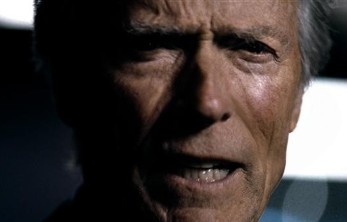Who would think that a TV ad featuring Clint Eastwood giving America a pep talk would create so much political uproar?
“I was, frankly, offended by it,” said Republican strategist Karl Rove. “I’m a huge fan of Clint Eastwood, I thought it was an extremely well-done ad, but it is a sign of what happens when you have Chicago-style politics, and the president of the United States and his political minions are, in essence, using our tax dollars to buy corporate advertising.”

President Obama’s Chief Political Strategist David Axelrodsent a message via the Twitterverse affirming, “Powerful spot. Did Clint shoot that, or just narrate it?”
Through a shadowy tunnel, starring into the camera Clint Eastwood declares, “It’s halftime in America and our second half’s about to begin.” Republicans interpret this as a not-so-subtle reference to a potential second term for Obama.
Conservative commentator Michelle Malkin tweeted, “Did I just see Clint Eastwood fronting an auto bailout ad???”
In the New York Times (Feb. 6), however, “Mark McKinnon, Mr. Bush’s former advertising strategist noted that the ad’s message was ambiguous enough that it could be construed as helping Mr. Romney. ‘It’s half time in America,’ he said. ‘And we are way behind, and we need a new quarterback.’
All of this political spinsmanship is yet another example of confirmation bias. In my last book, Shameless, I asked Jamie O’Boyle, senior analyst for the Center for Cultural Studies and Analysis, why so many people continue to believe certain political myths when the facts say otherwise.
“The human brain is a meaning-seeking device,” O’Boyle said. “Although Western culture has a strong bias toward the importance of conscious ‘rational’ thought, over 90 percent of our decisions are made at an unconscious level. Thanks to brain imaging, we now know that, when the brain inputs data, the emotional centers light up first (what does this mean to me?), followed by the logic centers (what do I do with it?). To a very large degree, this means that ‘facts’ are what people use to validate decisions already made at an unconscious level.
“One of the outcomes of this process is a confirmation bias – the tendency of our brain to easily accept information compatible with what we already know and – more importantly – minimize information that contradicts what we already know,even if what we ‘know’ isn’t true!
To reiterate Rove, “…it is a sign of what happens when you have Chicago-style politics, “and the president of the United States and his political minions are, in essence, using our tax dollars to buy corporate advertising.”
Actually, according to the Government Accountability Office Report on TARP (page 9), Chrysler received $4 billion on Jan. 2, 2009, 18 days before Obama took office, and $8.5 billion on April 30 when Obama was president.
“The unconscious weighing of information is one of the reasons it is so difficult to change people’s minds using logic. The information goes in but the importance the brain allots to each bit minimizes the effect of negative data while weighting more heavily the bits that already fit their preconceptions and worldview.
“This is a principal reason,” O’Boyle concludes, “why people don’t recall that commentators have given them information that was proven to be false. Their unconscious brain simply diminished its importance in favor of some other bit of information, and even the little that did get through faded rapidly from memory.”
In a press statement reported in the Wall Street Journal (Feb. 9), Chrysler’s National Dealer Council said, “We have no doubt that this ad had no political agenda of any kind but rather [was] a statement of fact and hope for the future for all of us and America.”
“In an e-mail, Mr. Eastwood said politics were not in the equation. ‘The ad doesn’t have a political message. It is about American spirit, pride and job growth.’ ”
Watch the ad, then tell me what you think.
Comments










